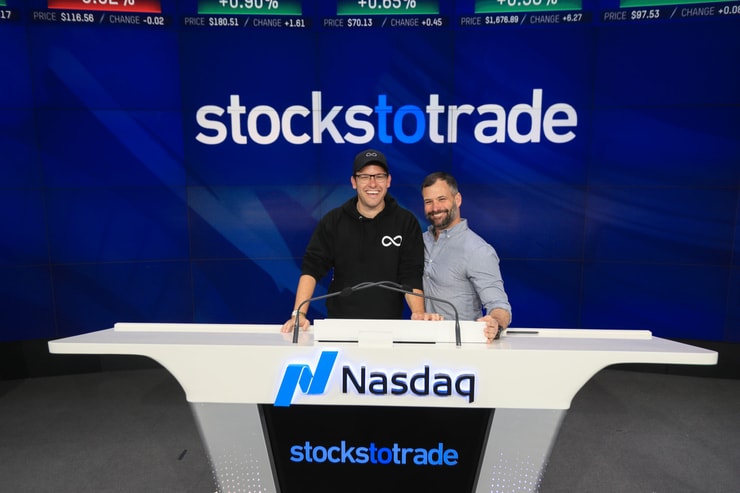Ever wondered, “how much do day traders make”? The answer might surprise you …
Whether it’s out of curiosity or the dream of becoming a successful day trader.
I get asked this question a lot.
The truth is, we’re all constrained by two main factors. This is what I’ve come to learn during my 20+ career as a trader.
My overall profit is determined by …
- Market volatility
- My position size
That means I make more money when the market gives me better setups. I also make more money when I size up.
Luckily, we’re in a bull market right now. It means there are more opportunities.
If you’re thinking about trading, now is the time to get your toes wet.
There are serious potential profits as a trader …
Table of Contents
- 1 What Is a Day Trader?
- 2 What Are the Characteristics of a Good Day Trader?
- 3 What Day Traders Do
- 4 How Much Do Day Traders Make?
- 5 How Day Traders Get Funded
- 6 Key Takeaways
- 7 Frequently Asked Questions
- 7.1 How Many Trades Can a Day Trader Make in a Day?
- 7.2 Is It Profitable to Be a Day Trader?
- 7.3 How to Avoid Losing Money as a Day Trader?
- 7.4 What Are the Key Things Beginners Need To Know About Day Trading?
- 7.5 What Is the Role of Leverage in Day Trading?
- 7.6 What Kind of Investment Do I Need To Start Day Trading?
- 7.7 How Much Do Day Traders Make in Different Cities Like San Diego, Boston, and Philadelphia?
- 7.8 How Does the Choice of Trading Platform and Brokerage Affect a Day Trader’s Earnings?
- 7.9 What Impact Do Taxes Have on a Day Trader’s Earnings?
- 7.10 How Can I Improve My Day Trading Results?
- 7.11 How Do Day Traders Use Data for Their Trading Decisions?
- 7.12 How Important Are Studies and Learning for Day Traders?
- 7.13 Are All Day Traders Winners?
- 7.14 What Does It Mean To Have a Career in Day Trading and What Resources and Options Are Available?
- 7.15 How Can Understanding Business, Finance, and Market Trends Affect Your Day Trading Strategy?
- 7.16 What Role Do Reviews, Prices, and Times Play in Successful Day Trading?
What Is a Day Trader?

Day traders, quite simply, trade securities within a single day.
They’re not investors hoarding stocks for years; they’re dynamic traders making numerous trades, buying and selling within the tight timeline of a single market day. The goal? Profit from price changes in assets like stocks, forex, or commodities.
There’s nothing inherently wrong with investing, it’s just not my expertise. I enjoy trading highly volatile stock movements.
This trading strategy relies on rapid-fire decisions backed by meticulous analysis and a solid understanding of market conditions.
Day trader’s don’t work 9-5 jobs. Trading careers are a roller-coaster ride of highs and lows dictated by the ebbs and flows of the market.
Trading isn’t for someone looking for a steady paycheck. It’s a path of potential financial independence, but with risk at every turn.
Day trading is a complex field that requires a deep understanding of various strategies and rules. We’re going to cover some basics in this article because wall street doesn’t talk about it …
When I started, no one was teaching this. I had to find a way on my own. But now I can pass that knowledge down to new traders.
I’ve been teaching for over a decade and I have over 30 millionaire students.
Click here to see where they started.
I showed them the rules. I can show you too.
One such rule is the pattern day trader rule, which applies to traders with accounts under $25,000. This rule can significantly impact your trading strategy and how many day trades someone can make. It’s crucial to understand it before you start day trading.
Learn more about the day trading rules under $25k to ensure you’re well-prepared for the market.
What Are the Characteristics of a Good Day Trader?

Good day traders are like disciplined surfers, riding the wave of market volatility. And they play their roles well.
The pros understand market trends and have the ability to react quickly to price changes.
Their arsenal is full of trading strategies suited to different market conditions, and they have a knack for risk management, crucial for navigating the choppy waters of the stock market.
Trading demands a high level of knowledge, sharpened by experience and constant education.
Day traders are always learning, whether from trading courses, market news, or the harsh lessons of losses.
Emotional control is another trait; they must be cool-headed, not allowing wins or losses to cloud their judgment. These qualities, along with a well-researched trading strategy, set the stage for profitability.
A good day trader is not only knowledgeable about the market but also has a clear understanding of how to make a living from day trading. It’s not just about making quick trades; it’s about making informed decisions based on market trends and patterns.
If you’re considering a career in day trading, it’s essential to understand how to day trade for a living. This knowledge will equip you with the skills needed to navigate the market successfully.
What Day Traders Do
Day traders keep their eyes glued to price movements and news that could trigger volatility.
They’re always ready to strike, to place an order when the moment is right. They don’t just trade randomly; their decisions are backed by comprehensive research and analysis. There are clear steps to take as a part of the trading process.
And yet, there are many different day trading strategies.
For example, some day traders engage in scalping, where they aim to profit from minute price changes in a stock.
Others might use swing trading strategies, holding onto a stock for a couple of days to capitalize on potential price trends.
Some take a page out of my book and trade intraday price momentum over a few minute time span.
Regardless of the approach, day trading requires swift decision-making and nerves of steel.
How Much Do Day Traders Make?

How much a day trader makes can range widely.
Somedays I feel like I’m raking in cash, some days I sit on my hands.
Here’s a review of a great week I had earlier this year …
It’s not a salaried job with a fixed income. Traders aren’t employees. Profits depend on a host of factors.
Some might make a hefty sum, while others might face losses. This is where the importance of risk management comes in, to keep losses under control while maximizing gains.
Risk is always part of my trading plan, because it’s ever present. I don’t know if you know this, but most traders lose.
A 2019 study called “Day Trading for a Living?” looked at the success rates of Brazilian traders over a 2-year window, and found that 97% of traders with more than 300 days of active trading lost money. Only 1.1%
But I’m proof the 1% exists. There’s a way to profit and that’s what I’m here to share.
While there isn’t a one-size-fits-all answer, the average day trader’s earnings can be influenced by their level of experience, how many shares they can buy, and their trading strategy.
Other variables like the asset class they trade (stocks, forex, commodities), market conditions, and their approach to risk can also sway their potential income.
How Day Traders Get Funded

There are as many ways to get funded as there are ways to make money.
One of my top students, Jack Kellogg, funded his account by working as a valet.
I started out with $12,000 of my Bar Mitzvah money.
Day traders need to be aware of the various factors that can impact their earnings, including taxes.
Day trading taxes can be complex, and understanding them is crucial for any trader.
It’s important to know how these taxes work, how they can affect your overall earnings, and how to manage them effectively.
For a comprehensive understanding of this aspect, check out this guide on day trading taxes. It will provide you with the necessary information to handle your taxes as a day trader.
Make sure to check out the links above. They’re good resources new traders can use to improve.
Required Starting Capital for Day Trading
Day trading isn’t a free ride. It requires capital.
The required starting capital can vary based on factors like the trader’s strategy, the market they’re trading in, and their individual risk tolerance.
In the U.S., for instance, the Financial Industry Regulatory Authority (FINRA) sets a minimum equity requirement for day traders at $25,000.
Salaries of Day Traders at Public Trading Firms
Day traders at public trading firms typically receive a base salary plus a portion of the profits they generate.
This compensation structure motivates them to optimize their trading activities for maximum profitability.
More Breaking News
- Huntington Bancshares Faces Earnings Miss, Market Considers Impacts
- Price Predictions Fueled by Company Moves In Market Dynamics
- TeraWulf’s Strategic Expansion Ignites Market Interest
- Bitcoin Crash Sparks Sharp Decline in Cryptocurrency Stocks
Factors Influencing Day Trader’s Earnings
Several factors can influence a day trader’s earnings.
These include the amount of capital they’re trading with, their trading strategy, their level of experience, and the market conditions they’re trading in.
Changes in interest rates or market volatility can impact their profits.
Day Trading for a Proprietary (Prop) Firm
Some day traders opt to work for a prop firm.
The reason is, these firms provide traders access to more capital than they would have in their individual accounts, amplifying their potential profits. However, these traders must share a portion of their earnings with the firm.
Key Takeaways

The income of day traders can vary greatly.
Their profits are shaped by factors such as their trading strategy, capital, and experience.
Day trading requires discipline, a solid grasp of market trends, and a thorough understanding of risk management. It’s not for everyone, but for those who master it, the rewards can be substantial.
Trading isn’t rocket science. It’s a skill you build and work on like any other. Trading has changed my life, and I think this way of life should be open to more people…
I’ve built my Trading Challenge to pass on the things I had to learn for myself. It’s the kind of community that I wish I had when I was starting out.
We don’t accept everyone. If you’re up for the challenge — I want to hear from you.
Apply to the Trading Challenge here.
Trading is a battlefield. The more knowledge you have, the better prepared you’ll be.
Have you ever made money as a trader? What pattern did you use? Let me know in the comments — I love hearing from my readers!
Frequently Asked Questions
How Many Trades Can a Day Trader Make in a Day?
The number of trades a day trader makes in a day depends on their trading strategy.
Scalpers may execute hundreds of trades, while swing traders may only make a few.
Regardless, every trade should be a calculated decision, not a wild guess.
Is It Profitable to Be a Day Trader?
Day trading can be profitable, but it isn’t a guaranteed money-making machine.
The profitability depends on various factors including the trader’s skill, experience, capital, and the ability to manage risk. Understanding market conditions and having a solid trading strategy also contribute to a day trader’s success rate.
How to Avoid Losing Money as a Day Trader?
To avoid losses, a day trader needs to have a clear trading strategy, maintain discipline, and employ rigorous risk management.
But ultimately, every trader will lose eventually.
My #1 rule, in plain english: Cut losses quickly.
They should never risk more than a small percentage of their trading capital on a single trade. Cutting losses quickly is as important as securing gains. And remember, every trade offers a lesson.
What Are the Key Things Beginners Need To Know About Day Trading?
Day trading is not for everyone.
It requires a specific set of skills and a substantial degree of knowledge about markets and trading strategies. It involves holding positions for a very short term – usually just a day – and making quick decisions based on price movements.
Risk management is crucial, as losses can pile up quickly. It’s also vital to understand commissions and fees charged by brokers as these can eat into your returns.
What Is the Role of Leverage in Day Trading?
Leverage allows day traders to amplify their position size and potentially earn higher returns.
It’s a loan from the broker to the trader, which can be a double-edged sword. While it can increase profits, it can also magnify losses.
It’s essential to use leverage carefully and understand the rules and requirements around it.
What Kind of Investment Do I Need To Start Day Trading?
The amount you need to start day trading depends on various factors including the type of instruments you plan to trade, your brokerage’s account minimum, and regulatory requirements.
For example, in the U.S., the Financial Industry Regulatory Authority (FINRA) imposes a $25,000 minimum equity balance for ‘pattern day traders’. This amount can differ if you are trading futures, forex, or other types of assets.
How Much Do Day Traders Make in Different Cities Like San Diego, Boston, and Philadelphia?
The net profit a day trader can make varies widely and can depend on factors such as the trader’s skill, the amount of capital they have, the strategies they use, and the market conditions.
Location can also play a role, especially when considering the cost of living. However, successful day traders can earn well above the average income regardless of their city of residence.
How Does the Choice of Trading Platform and Brokerage Affect a Day Trader’s Earnings?
The choice of trading platform and brokerage can significantly impact a day trader’s bottom line.
Some platforms offer advanced charting tools, high-speed executions, and other features that can aid in making quick and informed trading decisions. The brokerage’s commission structure and fees can also make a substantial difference.
Day traders tend to make many trades a week, and even small fees can add up.
What Impact Do Taxes Have on a Day Trader’s Earnings?
Taxes can significantly impact a day trader’s net profit.
In many countries, income from day trading is taxed differently than long-term investments.
It’s crucial to understand the tax laws and regulations in your country and factor these into your trading strategy. In some cases, day traders can deduct certain expenses related to their trading activities, such as the cost of trading software or educational resources.
How Can I Improve My Day Trading Results?
Improving day trading results often involves refining strategies, staying informed about market movements, managing risks effectively, and continually learning.
Utilizing resources like online tutorials, books, courses, and newsletters can help enhance your trading skills.
Following trading rules, such as setting a stop loss and not risking more than 1% of your trading account on a single trade, can also help protect your portfolio.
How Do Day Traders Use Data for Their Trading Decisions?
Day traders rely heavily on data, including real-time price information, volume data, and historical price trends. This data informs their trading decisions and helps them spot potential opportunities.
Utilizing advanced charting tools and technical indicators can also help in analyzing this data and making informed decisions.
How Important Are Studies and Learning for Day Traders?
Education is crucial in day trading.
It’s essential to understand different trading strategies, the mechanics of markets, and how to manage risk.
Continuous learning and staying updated about market trends and economic news can also help improve trading performance.
There are many resources available, including online courses, books, webinars, and forums, that traders can use to enhance their knowledge.
Are All Day Traders Winners?
Not all day traders are winners.
It’s a challenging field with a steep learning curve, and many traders may lose money, especially when starting. Success in day trading requires skill, discipline, a sound strategy, and a thorough understanding of the markets.
It’s important to set realistic expectations and not to get swayed by stories of traders making massive profits in a short time.
What Does It Mean To Have a Career in Day Trading and What Resources and Options Are Available?
Having a career in day trading means making strategic and quick decisions on buying and selling stocks, options, or currencies during the day, aiming to make a profit.
It’s a role suited for people who can tolerate high levels of risk and have STRONG analytical skills.
A variety of resources are available for day traders. These include educational content and tips available on websites and social media platforms like Instagram, software products for market analysis, and brokerage sites that offer trading accounts.
As a day trader, you have multiple trading options, including forex and stocks, and a lot of strategies to choose from like swing or trend trading.
How Can Understanding Business, Finance, and Market Trends Affect Your Day Trading Strategy?
Understanding business, finance, and market trends is crucial to day trading.
Knowledge of finance principles helps you analyze company performance and market trends, helping you make informed trading decisions.
Similarly, a solid grasp of business can provide insights into how various events or company decisions might impact stock prices.
Lastly, understanding market trends helps in identifying winners and losers in the market, adjusting your trading strategy, and timing your trades more effectively.
What Role Do Reviews, Prices, and Times Play in Successful Day Trading?
Reviews of trading platforms, brokerage firms, and even individual stocks can offer valuable insights and help you make more informed decisions.
However, always remember to cross-check information and understand that reviews can be subjective. Price trends are crucial to day trading as they influence when to buy and sell.
Timing is everything in day trading, and understanding how markets behave at different times of the day can significantly impact your returns.





Leave a reply